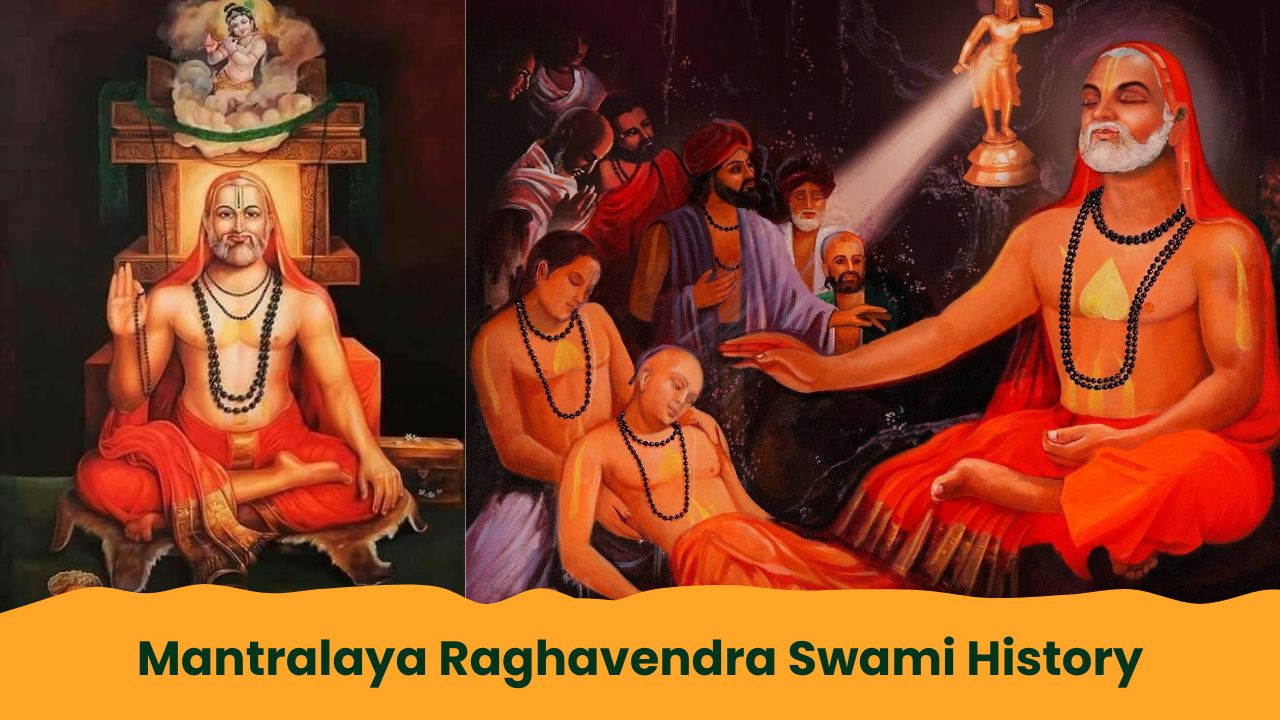Early Life and Family Background
Father : Thimanna Bhatta
Mantralaya Raghavendra Swami Family History
Thimanna Bhatta was a revered priest in the temple. Recognized for his piety and devotion, he was the first person to recognize his son, Raghavendra’s divine potential from a very young age. Thimanna Bhatta’s deep understanding of sacred scriptures and his devotion to religious practices laid a strong spiritual foundation for his son. Mantralaya Raghavendra Swami-A Detailed Family History
Mother : Gopikamba
Gopikamba, known for her unwavering devotion and piety, played a pivotal role in nurturing young Raghavendra’s spiritual inclinations. Her influence on his upbringing was profound, instilling in him the qualities of devotion, dedication, and a deep understanding of dharma (righteousness). Gopikamba’s guidance and support were instrumental in shaping Raghavendra’s early years and set the stage for his future spiritual journey.
Marriage and Personal Life
Wife: Sarasvati Bai
Sarasvati Bai was Raghavendra’s devoted wife. Their marriage was marked by mutual respect and spiritual alignment. Sarasvati Bai was a source of support and strength for Raghavendra. Her untimely death was a turning point in his life. Deeply affected by her loss, Raghavendra decided to take sanyasa (renunciation), marking the beginning of his transformation into Raghavendra Swami. This transition was not just personal but also signified his complete dedication to spiritual pursuits and service to humanity.
Son: Lakshminarayanacharya-Mantralaya Raghavendra Swami Family History
Lakshminarayanacharya, Raghavendra’s son, carried forward his father’s legacy of scholarship and devotion. He became a great scholar in his own right, contributing to the Madhwa philosophy and perpetuating the teachings and principles that his father upheld. Lakshminarayanacharya’s works and dedication ensured that the spiritual lineage and intellectual heritage of the family continued to flourish.
Historical Context
Raghavendra Swami was born in 1595, a period marked by significant political and social upheaval. The Vijayanagara Empire was in decline, and South India was under the influence of various Sultanates. These challenging times did not deter Raghavendra Swami; instead, they provided a backdrop against which his spiritual journey unfolded.
Influence of Madhwa Philosophy
The teachings of Madhwa Acharya, who established the Madhwa philosophy in the 13th century, profoundly influenced Raghavendra Swami. This philosophical school, emphasizing dualism and the distinction between the individual soul and the supreme being, shaped Raghavendra’s teachings and practices. Throughout his life, he remained a staunch proponent of Madhwa philosophy, contributing significantly to its propagation and understanding.
Key Achievements and Notable Events Early Recognition of Divine Knowledge
From a young age, Raghavendra Swami was recognized for his divine knowledge and wisdom. His father, Thimanna Bhatta, was among the first to acknowledge his extraordinary abilities. This early recognition set the stage for Raghavendra’s spiritual journey and his eventual renunciation.
Contributions to Madhwa Philosophy
Raghavendra Swami made significant contributions to the Madhwa philosophy. He established several mutts (monasteries) dedicated to teaching and disseminating the principles of this philosophical school. His scholarly works, including commentaries on the Vedas and Upanishads, continue to be influential.
Miraculous Healing of Aurangzeb’s Elephant
One of the most notable events in Raghavendra Swami’s life was the miraculous healing of Mughal Emperor Aurangzeb’s favorite elephant. This event solidified Raghavendra’s reputation as a saint with miraculous powers and further spread his fame.
Prediction of Vijayanagara Empire’s Fall
Raghavendra Swami predicted the fall of the Vijayanagara Empire. This foresight led him to relocate to Kurnool, where he spent the last 32 years of his life. During this period, he continued his spiritual practices and teachings, leaving an indelible mark on the region and its people.
Scholarly Works
Raghavendra Swami’s scholarly contributions are extensive. His commentaries on sacred texts such as the Vedas and Upanishads remain integral to the understanding of Madhwa philosophy. These works continue to be studied and revered by scholars and practitioners alike.
Taking Sanyasa
After the death of his wife, Sarasvati Bai, Raghavendra Swami took sanyasa (renunciation). This significant event marked his complete dedication to spiritual life. As Raghavendra Swami, he devoted himself to teaching, guiding, and uplifting those who sought his wisdom.
Legacy and Continuing Influence
Raghavendra Swami’s legacy is profound and far-reaching. His contributions to the Madhwa philosophy, his establishment of mutts, and his scholarly works continue to inspire and guide countless individuals. His life and teachings have left an enduring impact on the spiritual landscape of South India and beyond.
Through his divine wisdom, dedication, and miraculous deeds, Raghavendra Swami remains a beacon of spiritual enlightenment and a revered figure in the annals of Indian spirituality. His family’s legacy, from his parents’ devout upbringing to his son’s scholarly contributions, underscores the profound and lasting influence of his lineage.
